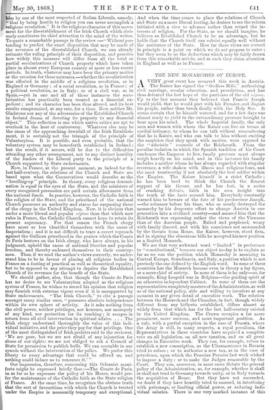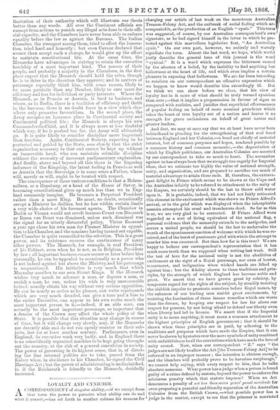THE NEW MONARCHIES OP EUROPE.
AVERY great event has occurred this week in Austria. The Kaiser has signed the "Godless Bills," authorizing civil marriage, secular education, and proselytism, and has thus defeated the last hope of the partizans of the old regime. Up to the last moment they believed that Francis Joseph would yield, that he would part with his Premier, and disgust his people, rather than break finally with the Holy See. It seems certain that he himself wavered, and for a few days was almost ready to yield to the extraordinary pressure brought to bear upon his mind. The whole Imperial family, the only men and women with whom the Kaiser can live on terms of cordial intimacy, to whom he can talk without remembering that he is Kaiser, and who can talk to him without exciting the suspicion that they speak with motive, were opposed to the "atheistic " counsels of the Reichsrath. From the peculiar isolation in which the Spanish tradition of his Court condemns the Emperor to live, family pressure must always weigh heavily on his mind, and in this instance his family includes a mother whom he has always regarded with singular reverence, a wife shaken with illness and religious fears, and the most trustworthy if not absolutely the best soldier within the Empire. The Kaiser himself is a strict Catholic ; he has been bred to think the Church the firmest support of his throne, and he has lost, in a series of crushing defeats, faith in his own insight into the truth of the facts around him. Everybody constantly warned him to beware of the fate of his predecessor Joseph, —the reformer before his time, who so nearly destroyed the monarchy by his desperate effort to change Austria in one generation into a civilized country—and assured him that the Reichsrath was expressing rather the views of the Viennese than of the Austrian people. Baited and perplexed, weary with family discord, and with his conscience not unwounded by the threats from Rome, the Kaiser, however, stood firm, and in signing the obnoxious bills he accepted his new position as a limited Monarch.
We use that very awkward word " limited " in preference to "constitutional," because our object to-day is to explain as far as we can the position which Monarchy is assuming in Central Europe, Scandinavia, and Italy, a position which is not precisely the one defined by the English word. In none of these countries has the Monarch become even in theory a lay figure, or a mere chief of society. In none of them is he only—as, for example, King Leopold was in Belgium—the guiding spirit of an otherwise independent Cabinet. In none of them are the representatives completely masters of the Administration, as well as of the national policy, able and willing to interfere at any moment in any given detail of executive work. The relation between the Monarch and the Chamber, in fact, though widely different from any hitherto established, differs almost as widely from that which has for the last half-century existed in the United Kingdom. The Crown occupies a far more prominent, more onerous, and more important position. As a rule, with a partial exception in the case of Prussia, where the Army is still, in many respects, a royal peculium, the Representatives in these countries have acquired a complete veto on all legislation, on all new taxation, and on all great changes in Executive work. They can, for example, refuse to establish a new conscription, as the Ultramonta.nes in Bavaria tried to refuse ; or to authorize a new tax, as in the case of petroleum, upon which the Prussian Premier last week wished to impose a duty ; or to make the Judges removable by the Court. They can, moreover, in most cases dictate the general policy of the Administration, as, for example, whether it shall or shall not tend in Germany towards unity, or in Italy towards the acquisition of Rome. But they have not succeeded, we doubt if they have heartily tried to succeed, in interfering with patronage, or limiting official power, or reducing indi- vidual salaries. There is one very marked instance of this
limitation of their authority which will illustrate our thesis better than any words. All over the Continent officials are exempt from actions to punish any illegal acts done in their offi- cial capacity, and the Chambers have never been able to enforce equality before the law as against the Bureaus. The Italian Chamber, the strongest among them, tried to effect the innova- tion, tried hard and honestly ; but even Cavour declared that sooner than accept such a change, he would give up the effort to maintain constitutional life. At the same time, the Monarchs have advantages in striving to retain the executive headship of a most important kind. The masses of their people, and probably a majority in the Chambers, in the first place expect that the Monarch should hold the reins, though he is to drive in the direction they approve; and in matters of patronage especially think him, with some reason, likely to be more patriotic than any Member, likely to care more for efficiency and less for individual or party interests. Where the Monarch, as in Prussia or Austria, is bred to business, and where, as in Berlin, there is a tradition of efficiency and thrift in the bureaus, there is no doubt force in a view which else- where only promotes favouritism. In the second place, the Army occupies an immense place in Continental society and Continental political life ; the Monarch is always his own Commander-in-Chief, and it is always more or less doubtful which way, if he is pushed too far, the Army will ultimately go. It is quite likely to consider discipline more important than freedom. Again, Continental Society, expecting to be protected and guided by the State, sees clearly that the strict organization necessary to that end cannot be kept up without an immovable head, who can maintain scientific discipline without the necessity of incessant parliamentary explanation. And finally, above and beyond all this there is the lingering influence of the Kingship, the latent feeling in Prussia as well as Austria that the Sovereign is in some sense a Father, whose will, merely as will, ought to be treated with respect.
The consequence of these various conditions is that a Hohen- zollern, or a Hapsburg, or a head of the House of Savoy, in becoming constitutional gives up much less than we in Eng- land commonly imagine. He becomes a Perpetual President rather than a mere King. He must, no doubt, occasionally accept a Minister he dislikes, but he has within certain limits a very wide choice of his foremost agents. The Chamber in Berlin or Vienna would not revolt because Count von Bismarck or Baron von Beust was dismissed, unless such dismissal was the signal for an utterly distasteful policy. Victor Emanuel a year ago chose his own man for Finance Minister in opposi- tion to his Chamber, and the nominee having turned out capable, the Chamber is quite reconciled to the selection. This is a great power, and its existence ensures the continuance of many other powers. The Monarch, for example, is real President of his Cabinet, even when he is not, as in Belgium, President by law ; all important business comes sooner or later before him personally, he can be lippealed to occasionally as a power who is not indeed against but above the Ministry,and his patronage is unquestioned. His initiative is very much that which Macaulay ascribes to our own Stuart Kings. If the Monarch wishes very much to advance a man, or depress a man, or enrich a man, he can, unless his wish is very unreasonable indeed, usually obtain his way without very serious opposition. He can be nearly as active as he pleases, can write reprimands which are very much dreaded, can give a tone and a bias to the entire Executive, can appear to his own realm much the most important person in it,—indeed, if an able man, can actually be the most important personage, so important that a demise of the Crown may affect the whole policy of the State. It is possible that this situation may change in course of time, but it will change very slowly, may, if the Monarchs are decently able and do not run openly counter to their sub- jects, last for at least another century. Parliaments, even in England, do executive work very badly, and in England there is no scientifically organized machine to be kept going through- out the country, at the risk of a general convulsion in society. The power of governing in its highest sense, that is, of direct- ing the line internal politics are to take, passed from the Kaiser when, in obedience to his Chamber, he signed the Civil Marriage Act ; but the power of administrating is undiminished, is, if the Reichsrath is friendly to the Monarch, decidedly increased.































 Previous page
Previous page